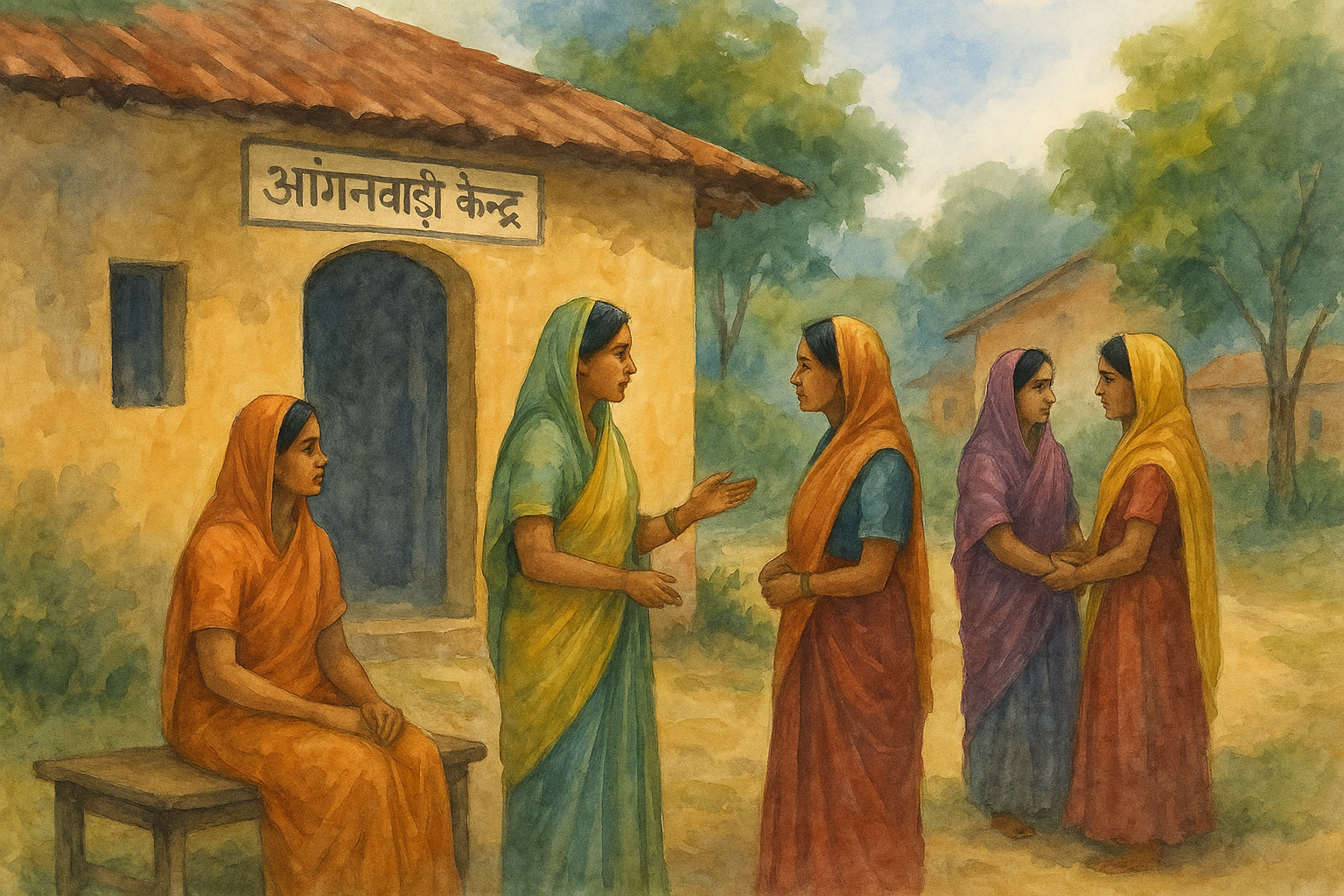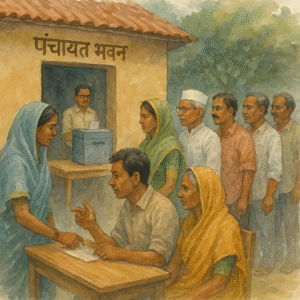Simplified Explanation of the Judgment
In this case, the Patna High Court delivered a joint judgment for two connected writ petitions related to the same Anganwadi Sevika post at Bhairo Beldaria, Nawada (Centre Code 256). The two petitions were filed by two women — both claiming eligibility and selection rights to the same position under the Integrated Child Development Scheme (ICDS).
The recruitment for the Sevika post began in 2016. After applications and a merit list, one of the candidates (respondent in the first case) was selected and appointed as Anganwadi Sevika by the Aam Sabha (village selection meeting). However, the other candidate (petitioner in the first case) complained that the selected candidate was not a permanent resident of the service area — a mandatory requirement under the Anganwadi Sevika/Sahayika Selection Guidelines.
After an inquiry, the District Programme Officer (DPO), Nawada, found that the selected candidate’s husband was a voter of another village, “Manjor Beldaria,” and that several official records (including police cases and ration card) showed the family’s address in that village. On this basis, the DPO cancelled her appointment on 30 June 2017.
The dismissed Sevika appealed to the District Magistrate (DM), Nawada, who also upheld the DPO’s findings on 18 May 2018 — confirming that she was not a permanent resident of the Bhairo Beldaria centre area. However, the DM directed that since the panel (merit list) was valid for only one year and had expired, a fresh advertisement should be issued for a new selection.
The first petitioner (who ranked second in the merit list) challenged this direction, arguing that once the selected candidate was disqualified, she should have been appointed automatically from the existing list. She relied on the 2013 amendment to the 2011 Guidelines, which allowed appointing the next candidate if the first appointment was cancelled.
However, the State Government’s counsel clarified that the 2013 Guidelines were no longer valid because new 2016 Guidelines had been issued — and the 2016 selection process was conducted under these new rules. The 2016 Guidelines had no provision for appointing the second candidate automatically. Therefore, once the first candidate’s appointment was cancelled and the panel expired, the only legal option was to hold a fresh recruitment.
The Court also examined whether the residence issue could be revisited under Article 226 of the Constitution. Justice Mohit Kumar Shah observed that there were concurrent factual findings by both authorities (DPO and DM) proving that the disqualified candidate was not a permanent resident. Since these were findings of fact, the High Court held that they could not be reopened in a writ jurisdiction.
Citing several Supreme Court rulings — such as Punjab National Bank v. Atmanand Singh (2020), Krishnanand v. Director of Consolidation (2015), and State of U.P. v. Lakshmi Sugar & Oil Mills Ltd. (2013) — the Court reiterated that writ courts should not re-evaluate factual disputes that require evidence.
Ultimately, the Court dismissed both petitions, upholding the cancellation of the first appointment and confirming the DM’s order to conduct a fresh selection.
Significance or Implication of the Judgment
This judgment is important for several reasons:
- Fairness in Local Appointments: The High Court reinforced that only permanent residents of the Anganwadi Centre area are eligible for appointment as Sevikas. This ensures that beneficiaries are selected from within the local community, maintaining fairness and transparency.
- Clarification on Expired Panels: Once the validity of a selection panel expires (one year under the 2016 Guidelines), no appointment can be made from that list. Even if litigation delays the process, the recruitment authority must start afresh.
- No Automatic Appointment of Second Candidate: The Court clarified that, under the 2016 Guidelines, there is no provision to automatically appoint the next-ranked candidate if the first is disqualified. The process must restart to maintain procedural integrity.
- Judicial Restraint in Factual Matters: The judgment emphasizes that High Courts, while exercising writ jurisdiction, cannot interfere with concurrent factual findings unless they are perverse or without jurisdiction.
- Administrative Guidance: District Magistrates and Programme Officers must strictly follow the prevailing selection guidelines, ensuring that recruitment procedures are updated according to the latest government policies.
Legal Issues and Court’s Findings
- Whether the selected candidate (Sevika) was a permanent resident of the service area?
✅ Finding: No. Based on multiple records, she was found to be a resident of another village (Manjor Beldaria). - Whether the second-ranked candidate had a right to appointment after cancellation of the first?
❌ Finding: No. Under the 2016 Guidelines, there is no such right. The 2013 provision had been replaced and was no longer valid. - Whether a fresh selection process was required?
✅ Finding: Yes. Since the panel’s one-year validity had expired, fresh recruitment was the only legal recourse. - Whether the High Court could re-examine factual findings of residence?
❌ Finding: No. Such issues involve evidence and cannot be reconsidered under Article 226 jurisdiction.
Judgments Referred by Parties
- State of U.P. v. Ram Swarup Saroj, (2000) 3 SCC 699 — regarding relief even after expiry of a panel during litigation.
Judgments Relied Upon by Court
- Brahm Deo Singh v. State of Bihar, (1994) 2 PLJR 852 — panel life limited to one year.
- Shankarsan Dash v. Union of India, AIR 1991 SC 1612 — no vested right to appointment merely from inclusion in a panel.
- Punjab National Bank v. Atmanand Singh, (2020) 6 SCC 256 — limits of writ jurisdiction in factual disputes.
- State of U.P. v. Lakshmi Sugar & Oil Mills Ltd., (2013) 10 SCC 509 — High Court cannot reappraise factual findings.
- Krishnanand v. Director of Consolidation, (2015) 1 SCC 553 — same principle reaffirmed.
Case Title
Ranju Kumari v. The State of Bihar & Ors.
(with connected case: Arti Kumari v. The State of Bihar & Ors.)
Case Number
CWJC No. 12462 of 2018 (with CWJC No. 15178 of 2018)
Citation(s)
2021(2) PLJR 761
Coram and Names of Judges
Hon’ble Mr. Justice Mohit Kumar Shah
Names of Advocates and Who They Appeared For
- For Petitioner (CWJC 12462/2018): Mr. Sidhendra Narayan Singh, Advocate
- For Petitioner (CWJC 15178/2018): Mr. Mithilesh Kumar Upadhyay, Advocate
- For State: Mr. Sunil Kumar Mandal (SC-3), with Smt. Neelam Kumari & Mr. Bipin Kumar, ACs to SC-3
- Mr. Gyan Prakash Ojha, GA-7 (for State in connected matter)
Link to Judgment
MTUjMTI0NjIjMjAxOCMxI04=-QeGrOzAzP9A=
If you found this explanation helpful and wish to stay informed about how legal developments may affect your rights in Bihar, you may consider following Samvida Law Associates for more updates.








